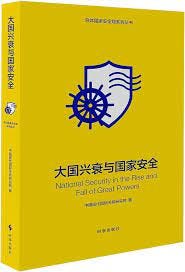The MSS Uncovers the Laws of History
Chinese Intelligence Analysts Argue that Science and Technology Decide the Fate of Great Powers
Is history the result of accident, or does it follow a constant logic? Are there patterns to be found in the growth of great empires? Are there laws that determine historical cycles of rise and fall? Researchers at the China Institutes of Contemporary International Relations (CICIR) believe that such patterns do exist—and they want the cadres of the Communist Party to know about them. This week CST presents a translation of their conclusions.
CICIR is the chosen in-house think tank of China’s premier intelligence agency, the Ministry of State Security. Western counterintelligence agencies identify CICIR as an unofficial bureau of the MSS; open-source research on CICIR confirms the tight links between CICIR analysts and MSS officers. The closest analogy on the American scene might be the relationship the RAND Corporation had with the U.S. Air Force in its early years. RAND research had a dual role: it both refined the concepts that guided Air Force procurement and strategy while justifying the Air Force’s approach to other actors in the American national security system. CICIR research—especially research published only in Chinese, and thus not aimed at international audiences—likely performs a similar function. CICIR publications signal the priorities of China’s state security apparatus and shed light on the ideas that have purchase in China’s civilian intelligence agencies.
This week CST has translated and published an excerpt from a 2021 book authored by a team of CICIR analysts: National Security and the Rise and Fall of Great Powers. Dissecting the rise and fall of imperial Spain and Portugal, the Netherlands, the British Empire, post-Meiji Japan, the United States, and the Soviet Union, this book strives to uncover the “internal causal logic” and the “shared characteristics in the path and the experience of nations that have risen in the past.” Most of the book consists of these individual case studies. We have translated the summary chapter that attempts to the synthesize the lessons of these case studies into a set of general principles with universal application: “General Laws of the Rise of Great Powers.”
These laws are not difficult to summarize: For the last five hundred years international relations have been characterized by intense competition between various great powers. Other things being equal, the relative strength of a state is a function of the territory, population, and natural resources it controls. Yet other things have not been equal. Since the advent of the scientific and commercial revolutions, technology has provided the most decisive advantage on the international stage. Power flows from prosperity. Prosperity, from productivity. Therefore, nations rise by successfully incorporating advanced technology into their national economy. Failure to catch the latest techno-scientific wave means stagnation, decline, and defeat.
The CICIR analysts suggest that economic development in modern conditions follows a predictable pattern:
In the modern sense, economic development usually means a transition from agriculture to low-tech industry, then on to high-tech industries and service industries. Each country's path to industrialization is not identical, but they conform to a similar law of industrial progress, usually developing industry in a sequence that begins with food, moves next to textiles, then machinery, chemicals, electronics, and so on, developing around these focal points in turn. As primary, secondary, and tertiary industries evolve successively to take the main position in social production, the dominant industry also upgrades gradually from labor-intensive to capital- and technology-intensive. In the industrialization of developed nations, light industry usually develops first, followed by heavy industry.
Many failures in development are the result of deviations from this path. Rise and Fall informs us that this was the case with the Communist bloc during the Cold War, whose members unwisely tried to leap directly to the heavy industry stage of industrial development. The chapter argues that many developing nations who have prioritized political liberalization over industrialization have fallen victim to a similar trap.
21st century China has avoided all traps. Blessed with enormous advantages in territory, population, and natural resources, integrated into the largest economic trade network in world history, governed by a stable center of rule, and having successfully ridden the development escalator to the frontiers of scientific discovery, the People’s Republic of China has mastered the arts of the rising power. The only thing it now lacks is outright technological supremacy.
Above all else, technological supremacy is what matters:
Scientific and technological innovation is a key force for economic growth, and it serves as a crucial indicator for the actual strength of a great power…. The countries that can occupy leadership positions are not those with the most resources, but those that can control the political environment and make other countries ‘do what they want.’ Whoever can lead a new round of scientific and technological revolution led by the information revolution will be able to occupy a leadership position in the future political landscape.
Perhaps the most interesting aspect of this narrative are the things missing from it. This study has very little to say about military strategy and force structure, alliances and diplomacy, taxation and debt, social cohesion and civil war, or espionage and ideology. The CICIR team understands rise and decline in techno-industrial terms. Everything else is either a distraction from or a downstream consequence of that fundamental factor.
This is significant. This report on the rise and fall of great powers is composed by analysts on the payroll on the Ministry of State Security. It has the words “national security” in its title. Yet it has little to say about diplomacy, strategy, or spycraft. There are of course many other sources that talk about such things—some translated by CST. However, this piece makes clear that there are influential actors in China’s state security ecosystem that believe geopolitical competition is simply technological competition by another name.
Read the full translation and analysis of this excerpt HERE.




